Allah Curses She Who Gets Tattooed
March 20, 2013Teenagers worldwide have to listen to the same old advice, “but what if you get bored of it,” “what if you get HIV,” “why do you want to look like a prisoner” and the good old “it’s a decision you will regret when you grow older.”
The arguments parents make against tattoos are more or less the same, even if the parent himself has a tattoo of his own. Because teenagers aren’t legally permitted to get tattooed before 18 in many countries, they live with the dream of getting inked until they are finally legal adults responsible for their own decisions and finally go ahead and get that design they lusted after for months, years or even days.
In Egypt, however, the problem isn’t turning 18, it isn’t even one’s parents. Before getting that tattoo, one contemplates not only whether he will get bored of it or not, but how society will react, how their conservative friends will take it, whether they can ever go to umra (lesser pilgrimage) again and even if they are allowed into heaven.
Let us just point out before we go on that starting out the research for this article we were almost positive of the response we will get from Dar El Ifta about the religious views on tattoo. For now, we will just tell you that a deterministic “no” was far from the response we got.
With the exception of traditional Coptic tattoos, other forms of body art, although becoming the latest hype, still trigger a certain prejudice about the inked person.
In a society where religion is intertwined with public life and traditions are often perceived of higher importance than individuality and personal beliefs, the idea of tattoos — although more acceptable to younger, more liberal and higher classes — still remains a taboo in the society at large. This, coupled with the state’s lack of control over tattoo parlors, poses serious health threats that often pass unnoticed with the process being normally performed behind not only parents’ backs, but also the state’s.
Men’s perception
We went out polling men from upper and middle classes on how they perceived inked girls to find that 32% of our respondents thought inked ladies are sexy while 36% thought they were daring and around 7% labeled them “slutty”
What’s interesting is that 21% of our respondents labeled girls with tattoos as “open-minded,” which might mean either liberal or a more polite Egyptian way of calling them loose.
Editor’s note: Check out the detailed results of how men perceive tattoos here.
The society
Society’s stand from tattoos is rather confusing. Many mothers will get their eyebrows and lips permanently made up but would never allow their daughters to get so much as a small star on their backs.
Laurice Matta, tattoo artist and owner of Ten, a beauty and tattoo parlor, explains that although tattoos are becoming trendy, many come in asking for tattoos in areas that don’t show.
Hoda Hassan* is in her mid forties and had her eyebrows tattooed for over 18 years. Because she is afraid it might be against religion, she gets the temporary eyebrows tattoo, which lasts for around a year and is then re-applied. It uses the same method, but only fades away after a few months.
*Names have been changed to protect sources’ privacy.
When asked about whether she would allow her daughter to get a tattoo, Hassan immediately responds that while she might allow her an eyebrows tattoo, she would never let her have any other body tattoo.
When Hana Ahmed got her first tattoo she got mixed reactions from society, ranging from those making arguments about it being against religion to others telling her she will regret it later. “Someone actually told me that when I die they are going to remove the inked skin off my body because it is haram (sinful),” recounts Ahmed.
Sundos Al Ayoub, who blogs about her view of tattoos here, recounts that she was concerned about the reputation that follows a girl when she gets a tattoo. She adds that although the Islamic culture believes tattooing is a deviant art that will not grant its bearer heavens, this belief never existed in her mind.
This belief, however, is so engraved in some people’s minds that it is keeping some from going to Umra out of fear of being prosecuted in the conservative Saudi Arabia.
Although Mohamed Samy believes it is nobody’s place to judge him, he can’t fulfill his desire to go to the lesser pilgrimage because he has a tattoo on his back and another on his arm. “I’m not sure if the fanatics will allow it there,” he explains. “Religion is between me and God, no one has the right to interfere.”
Tattooist Ossama Ayoub, who has a barber’s shop in Shoubra that dubs as a tattoo parlor, explains he often gets death threats through emails and on his Facebook account over the tattoos he showcases.
Weighing in on the religious aspect
Although most Muslims will respond instantly that tattoos aren’t allowed by Islam without blinking, our research has led us to believe it might just be one of those grey areas.
The one thing mentioning tattoos in Islam is the hadith (prophet’s saying) that states “Allah curses the women who perform tattoos, get tattoos, the women who pluck the eyebrows of others, and those women who get their eyebrows plucked and part their teeth for adornment; who change Allah’s creation.” This hadith was narrated by Abdu Allah Ibn Masoud and mentioned in Al-Bukhari and Muslim books.
Researching the fatwas (religious advisory opinions) available on plucking eyebrows we found one on Dar El Ifta’s website by the grand Mufti Sheikh Ali Gomaa saying that unmarried women are forbidden from plucking their eyebrows “except for the purpose of treatment, removing a defect or refining excessive hair.” The fatwa adds that it is permissible for married women to pluck their eyebrows with their husband’s permission “since it is considered from what are classified in Islamic law as adornments.” This, scholars analyze, is permitted because Aicha, Abu Bakr’s daughter and one of prophet Mohammed’s wives, had told a woman she can pluck her facial hair to “keep disturbances [from you and your husband] away as much as possible.”
So why is it that tattooing is considered sinful and frowned upon while the same hadith that mentions it bans plucking eyebrows, yet the latter is largely acceptable by society, safe for a few conservative Islamists?
We researched the web looking for answers and during our research, found that tattooing is permissible in the Shiites sect of Islam as long as it doesn’t bear the names of God, verses from the Quraan or designs against religion.
We emailed Dar El Ifta and placed a call asking them why it is said that tattooing is sinful given that the same hadith that forbids tattoos forbids plucking eyebrows. The answer we received was surprising, to say the least.
The response was that tattooing is “prohibited according to the opinion of the majority of scholars such as Shafi’ jurists and others.” They added that this is due to the unnecessary pain and harm it inflicts on the person and refer to the above mentioned hadith as well as the verse that says “I will command them to tamper with Alla’s creation,” (An-Nisa: 119).
So far, so predictable. But it was the second part of the fatwa that came as a shock to us.
“However, there is no objection to a woman adorning herself to her husband through getting tattooing that do not cause bodily harm as it has been stated by Aisha, the mother of the believers (may Allah be pleased with her) and many scholars,” the fatwa council told us. “This proves that prohibition here is not general since a wife is commanded in Islamic law to adorn herself for her husband to help him maintain his chastity provided this does not cause her harm.”
The response left us puzzled, to put it mildly, as to where exactly religion stands from tattooing.
The dangers
Of all the popular and most established tattoo parlors in Egypt, none operate legally. Some of them operate inside a licensed beauty parlor and others in the privacy of their own homes, since the government does not license tattoo parlors.
Although we couldn’t reach an official response before time of publishing, the tattoo artists we interviewed conveyed their concerns on how they can’t get licensing from the ministry of health if they wanted to legitimize their operations. Rest assured though that despite them being unlicensed, those we recommended all followed correct hygiene procedures to prevent blood-transmitted diseases, like wearing gloves while operating and using disposable needles.
The fact that tattoos remain one of those ‘under the table’ processes due to licensing issues, poses a serious health threat that can range anywhere from allergies to blood-transmitted diseases.
One of the tattoo artists we interviewed, Ayoub, boasted about using dentists’ anesthesia, something he admits is illegal given he has no medical background or proper knowledge of administering shots or anesthesia.
Although Ayoub’s parlor is clean and his procedures hygienically safe, we were alarmed by his use of aesthesia without proper knowledge; something that should be monitored and banned had tattoo parlors been under state control. Apart from the obvious issues of anesthesia overdose, people also have allergic reactions and those with certain medical conditions need to be extremely cautious with anesthetics. Ayoub shrugs the dangers off saying that worst-case scenario is the person turns out allergic, but even then he can always call for the help of his dentist or pharmacist neighbor, he says.
Other issues that might arise from the lack of state’s control over tattooists are blood-transmitted diseases like HIV and Hepatitis C since no health control governs the parlors. While tattoo parlors in upscale areas are most likely to use disposable needles, other tattooists who operate in barbers’ shops or in religious festivals are unlikely to do so, putting risks of infections at much higher rates.
While in most countries where tattooing is legal those under 18 cannot get tattooed without their parents’ legal consent, this condition is often overlooked in Egypt. Although people like Matta require the attendance of a legal guardian for those under 18, most others do not, including Ayoub.
Without any health control over tattoo parlors or laws preventing underage tattooing and with most parents most likely to flat out reject the idea of tattoos, the youth is left without any awareness or laws to protect them from dodgy tattooists.
Editor’s note: If you’re considering getting inked, read our review of trusted tattoo parlors in Cairo and what to look for in your tattooist.
Tattoos might be the latest hype among certain social circles, but to say that society is acceptable of inked skin is a far cry from the truth.

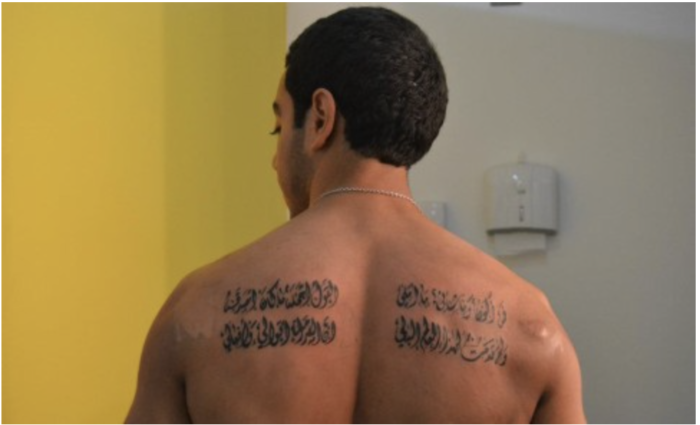
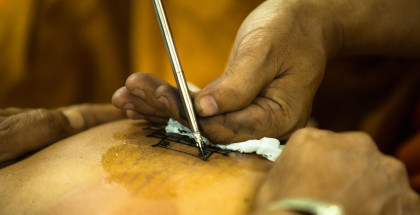
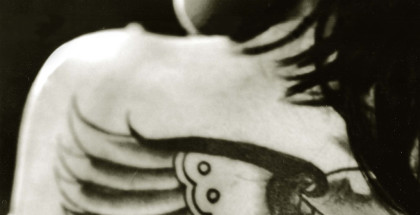
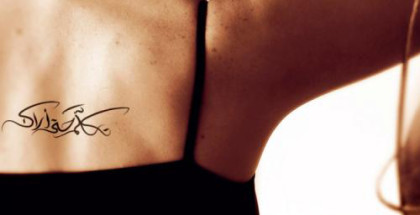
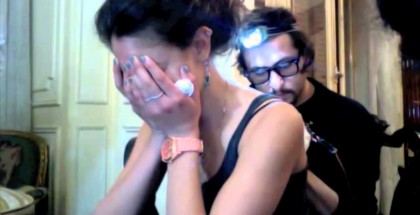
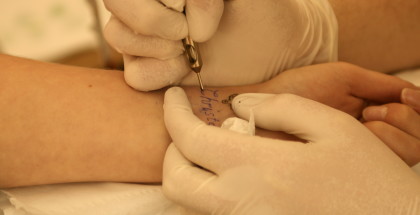
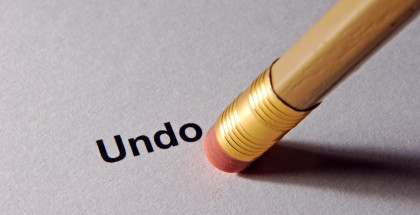
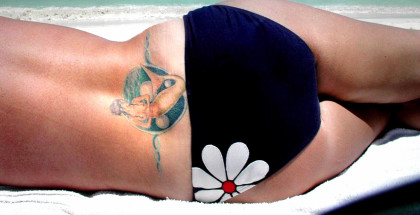













Submit a Comment